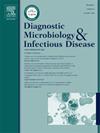Molecular analysis and ceftazidime–avibactam susceptibilities of carbapenem-resistant Klebsiella pneumoniae: Seven year experience from blood cultures of liver transplant recipients in a university hospital
IF 1.8
4区 医学
Q3 INFECTIOUS DISEASES
Diagnostic microbiology and infectious disease
Pub Date : 2025-08-20
DOI:10.1016/j.diagmicrobio.2025.117077
引用次数: 0
Abstract
Background
Carbapenem-resistant Klebsiella pneumoniae (CRKP) infection is a major cause of mortality in liver transplantation (LT) recipients.
Methods
We aimed to elucidate the molecular mechanisms of carbapenem resistance among CRKP strains and determine ceftazidime-avibactam (CZA) in vitro susceptibility in high-risk patient populations, such as LT recipients.
Results
Of the 127 LT recipients between January 2016 and 2022, no statistically significant difference was found in the in vitro sensitivity of amikacin, gentamicin, ciprofloxacin, levofloxacin, imipenem, meropenem, piperacillin–tazobactam, trimethoprim–sulfamethoxazole, tigecycline, and colistin in patients with CRKP sepsis who survived and died at 30 days, except for amikacin and meropenem, which was statistically significant at 90 days (p ≤ 0.05). Of the isolates, 120 (94.4 %) were positive for the modified carbapenem inactivation test. When the carbapenemase genes of 127 CRKP isolates were analyzed, the most common carbapenemase gene was OXA-48 (59.1 %). The presence of OXA-48, OXA-48 + NDM, NDM, IMP, and VIM genes in CRKP isolates showed a statistically significant difference with the CZA susceptibility result (p ˂ 0.05).
Conclusions
The presence of the OXA-48 resistance gene in CRKP isolates was closely associated with in vitro susceptibility to CZA, regardless of the diversity of the patient population.
碳青霉烯耐药肺炎克雷伯菌的分子分析和头孢他啶-阿维巴坦敏感性:一所大学医院肝移植受者血培养的7年经验
耐碳青霉烯肺炎克雷伯菌(CRKP)感染是肝移植(LT)受者死亡的主要原因。方法研究CRKP菌株碳青霉烯类耐药的分子机制,并在肝移植受体等高危人群中检测头孢他啶-阿维巴坦(CZA)的体外敏感性。结果2016年1月至2022年1月接受LT治疗的127例CRKP脓毒症患者中,除阿米卡星、美罗培南、环丙沙星、左氧氟沙星、亚胺培南、美罗培南、哌拉西林-他唑巴坦、甲氧苄氨嘧啶-磺胺甲新唑、替加环素、粘菌素在存活和死亡时间为30天的患者中阿米卡星、美罗培南在90天的体外敏感性差异有统计学意义(p≤0.05)外,其他药物的体外敏感性差异均无统计学意义。改良碳青霉烯类灭活试验阳性120株(94.4%)。对127株CRKP分离株碳青霉烯酶基因进行分析,最常见的碳青霉烯酶基因为OXA-48(59.1%)。在CRKP分离株中OXA-48、OXA-48 + NDM、NDM、IMP和VIM基因的存在与CZA的易感性结果有统计学差异(p小于0.05)。结论无论患者群体的多样性如何,CRKP分离株中OXA-48耐药基因的存在与体外对CZA的易感性密切相关。
本文章由计算机程序翻译,如有差异,请以英文原文为准。
求助全文
约1分钟内获得全文
求助全文
来源期刊
CiteScore
5.30
自引率
3.40%
发文量
149
审稿时长
56 days
期刊介绍:
Diagnostic Microbiology and Infectious Disease keeps you informed of the latest developments in clinical microbiology and the diagnosis and treatment of infectious diseases. Packed with rigorously peer-reviewed articles and studies in bacteriology, immunology, immunoserology, infectious diseases, mycology, parasitology, and virology, the journal examines new procedures, unusual cases, controversial issues, and important new literature. Diagnostic Microbiology and Infectious Disease distinguished independent editorial board, consisting of experts from many medical specialties, ensures you extensive and authoritative coverage.

 求助内容:
求助内容: 应助结果提醒方式:
应助结果提醒方式:


